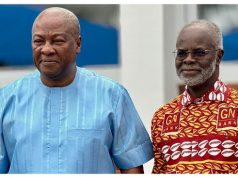The Land surveying division of the Ghana Institution of Surveyors has called on government to involve them in major decision-making processes on the environmental and infrastructural management to help develop Ghana.
They are of the view, their absence in policy making leaves a huge gap to be filled in the development of Ghana. The call from the group was made at the just ended Annual Conference of Professionals in Accra on the theme “Setting the Agenda for Sustainable Environmental and Infrastructural Development in Ghana”.
The conference which was declared open by the Deputy Minister of Lands and Natural Resources, Benito Owusu Bio was attended by the several industry players.
The Land Surveying Division of the Ghana Institution of Surveyors recognized the many innovative governance efforts towards land tenure security, food security, environmental sustainability, infrastructural development, eradication of poverty, and other programmes that give voice to community development needs in Ghana.
Nevertheless, presenters and participants noted that lack of the mechanism for monitoring and implementing the extent of environmental degradation, non-involvement of Land Surveyors in the major environmental and infrastructural decision-making processes are some shortcomings that hinder a better management of the environment and infrastructure in Ghana and therefore appealed to the government to change the status quo.
Below is the full report from the Lands Surveyors Conference
GHANA INSTITUTION OF SURVEYORS (GhIS)
LAND SURVEYING DIVISION
COMMUNIQUE ISSUED AT THE END OF TWO-DAY LAND SURVEYORS’ SEMINAR HELD AT GHANA-INDIA KOFI ANNAN ICT CENTRE, ACCRA
The Annual Seminar of the Land Surveying Division of the Ghana Institution of Surveyors (GhIS) was successfully held at Ghana-India Kofi Annan ICT Centre cantonments, Accra from 16th -17th August, 2017. The theme for the two-day Seminar was “Setting the Agenda for Sustainable Environmental and Infrastructural Development in Ghana”.
The delivery format of the Seminar included eight (8) lead presentations followed by exhaustive discussions by the participants. The following lead presentations were made:
a) Broadening Ghana Geospatial/Addressing Management Infrastructure Footprint- The Role of the Private Sector;
b) Our Land, our Heritage and the Eleventh Commandment-quo Varmus?;
c) Monitoring the Extent of Reclamation of Small Scale Mining Areas;
d) Investigating the Performance of Multivariate Adaptive Regression Spline (MARS) Approach in 2D Coordinate Transformation; #
e) Artificial Neural Network and Maximum Likelihood Approaches in Mapping Urban Expansion;
f) Using GIS as a tool for locating food joints;
g) Using the ArcGIS Model Builder to Develop a Desktop Map Generalisation Module for Multi-scale Mapping; and j) Using GIS for Online Search Report.
The workshop was declared open by the Deputy Minister of Lands and Natural Resources, Hon. Benito Owusu Bio, who represented substantive Minister. In attendance were Nii Odartey Willington, who represented Nii Okwei Kinka Dowuona II, Paramount Chief of Osu Traditional Council and President of Greater Accra Regional House of Chiefs and Osabarima Adusei Peasah IV, Akyem Tafohene, who addressed the gathering.
The President of Ghana Institution of Surveyors (GhIS), Surv. Edwin Addo-Tawiah gave the opening remarks. The Senior Vice-President of GhIS, Surv. Surv. Egbert Kwadwo Hohoabu, who also represented the Quantity Surveying Division, Surv. Alhaji Sulemana Mahama, Chairman of Valuation and Estate Surveying Division and Surv. Kwame Tenadu, the President of Licensed Surveyors Association of Ghana (LISAG), gave solidarity messages. Surv. John K. Amaglo, the Chairman of Land Surveying, gave the welcome address and the objective of the seminar.
The Land Surveying Division of the Ghana Institution of Surveyors recognises the many innovative governance efforts towards land tenure security, food security, environmental sustainability, infrastructural development, eradication of poverty, and other programmes that give voice to community development needs in Ghana. Nevertheless, presenters and participants noted among others, the following challenges in the efforts to ensure sustainable management of the environment and infrastructure in Ghana:
Lack of mechanism for monitoring and implementing the extent to environmental degradation;
Non-involvement of Land Surveyors in the major environmental and infrastructural decision-making processes;
Lack of supervision in survey and mapping at the local levels, especially demarcation and surveying of mining concessions at the district level;
Presence of non-professional Surveyors who are deeply involved in demarcation and surveying;
High import duty on survey equipment, and;
The high cost of land survey services.
Following the discussions and interactions, therefore, we the participants of the Annual Land Surveyors Seminar 2017 make the following recommendations and conclusions:
The absence of Surveyors leaves a huge gap to be filled in the development of Ghana. Therefore, Government should involve Land Surveyors in the major decision-making processes, especially on environmental and infrastructural development and management;
Government should collaborate with Surveyors to develop mechanisms for monitoring the environment;
Land Surveyors recognize Government efforts to clamp down the galamsey menace in Ghana. However, there should be a nexus between industries and practice, government and professional Land Surveyors in the fight against galamsey in order to ensure sustainability. Land Surveyors will collaborate with Government to provide the appropriate technology that will help local communities to reclaim the lands destroyed through galamsey operations.
The cost of rendering survey services is influenced by a number of factors, especially the cost of survey equipment and the available technology used to render that service. Land Surveyors recognize recent decrease in tax on some imported goods. However, in order to reduce cost of surveys,
Government should reduce the duty on the importation of survey equipment.
Government should invest in the use of modern technology in the production of maps. The Survey and Mapping Division (SMD) of the Lands Commission must be resourced to produce large scale maps for the entire country. This will reduce the cost of surveying in the production of maps;
Eliminating non-professionals’ involvement in surveying activities requires strict supervision at all levels. The Survey and Mapping Division of the Lands Commission must be resourced well in order to be able to supervise survey activities in the country. Land Surveying Division of GhIS will assist SMD to clamp down non-professionals who undertake surveys and bring the name of Land Surveyors into disrepute;
Every district should have professional /licensed surveyors who will supervise surveys. These District surveyors could also assist the local communities to demarcate their lands given as mining concessions. This will help communities appreciate their land that has been given out as concessions;
Land Surveyors shall lead the crusade of sensitizing and educating the public on the need to conserve our environment;
Land Surveyors will engage with the Department of Land Use and Spatial Planning to produce land use plans for the local communities. Government should also support this collaborative effort by creating the enabling environment; and
Land Surveyors should upgrade themselves to be abreast with modern techniques for collecting spatial data and producing maps.








